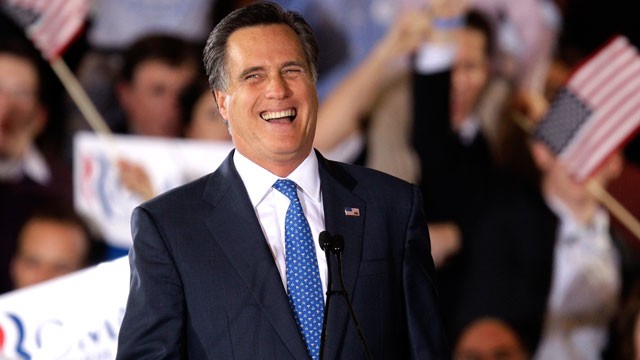Garry Wills, one of my favorite essayists, has a blog post on Mitt Romney’s laughter in which he invokes Lewis Carroll’s Cheshire Cat (in Alice in Wonderland), a Milan Kundera article on laughter, and Dostoevsky’s Idiot. (A tip to Michael Tomaskey for alerting me to it.) As I always say, there’s nothing like the classics to help us make sense of things in the world that puzzle us.
What puzzles Wills is Romney’s laugh. Here’s the dilemma as he sees it:
Everyone has noticed by now the non-laugh laugh of Mitt Romney, a kind of half-stifled barking. But what does it mean? It is blurted out as abruptly as it is broken off. Is it a kind of punctuation, part comma, part full stop, part interrogatory mark? What, if anything, is it trying to convey? Why does it seem more like coughing or burping than laughter?
Wills comes up with the five explanations, the last one drawn from Lewis Carroll:
Does it mean: “I know you are saying something critical about me, and I don’t know how to answer it, so I’ll just pretend that you did not mean it seriously”?
Or: “I want to show I am just a regular fellow, so I’ll try out my regular-fellow laugh”?
Or: “I hope you will take what I just said as something humorous, though I doubt it, but I’ll see if I can start a laughing chain reaction”?
Or: “I want to change the subject, but there is no natural way to do that, so I’ll just throw in this comic rictus as a non-sequitur”?
Or: “The Cheshire Cat could evanesce by leaving just a smile behind, so maybe I can avoid attention by disappearing away from my laugh”?
Wills then turns to Kundera, whose developed a keen sense of comedy to survive in Communist Czechoslovakia and who has some of the most penetrating insights into laughter that I know (for instance, in Book of Laughter and Forgetting). In his essay “The Comical Absence of the Comic: Dostoevsky The Idiot,” Kundera describes how laughter doesn’t have to be attached to a sense of humor:
A curious thing: the ones who laugh most in [The Idiot] are not the ones with the greatest sense of humor; they are those who have none at all. A group of young people leave a country house to stroll in the park; three girls among them “keep laughing so complaisantly at Evgeny Pavlovitch’s banter that he comes to suspect they may no longer even be listening to what he’s saying.” This suspicion “made him burst into sudden laughter.” A fine observation: first the collective laughter from the girls who, as they laugh, lose track of their reason for laughing and go on laughing for no reason at all; and then the laughter (this sort, quite precious) of Evgeny Pavolovitch as he realizes that the girls’ laughter is devoid of any comical rationale at all, and, in the face of this comical absence of the comical, he bursts into laughter himself.
Wills says that if Romney were engaged in this kind of laughter, there might be some saving grace. But instead Wills sees the candidate engaged in a different kind of laughter, one that Kundera says he once witnessed: a man laughing when others so with the hope that he will fit in:
He opens his mouth wide, emits a very loud sound, and gesticulates: that is to say, he is laughing. But he’s not laughing like the rest of them: his laughter feels like a copy among originals. If I have never forgotten this tiny episode it is because it was a brand-new experience for me: I was seeing a person laugh who had no sense of the comical and was laughing only to keep from standing out from the crowd, like a spy who puts on the uniform of a foreign army to avoid recognition.
In my comic literature classes I teach different theories of laughter, including the idea that laughter is an expulsion of nervous tension. Find the scenes that you find funniest, I tell my students, because in those scenes you will discover what most makes you anxious. People may find drawing room comedies funny, for instance, if they have anxieties about behaving correctly in formal occasions.
Maybe Romney is anxious (for understandable reasons) about meeting up with people in the rough and tumble world of politics. His laughter, then, would conveys how ill at ease he is around other people, at least in public settings. Unfortunately for him, his laughter conveys his unease and helps explain why people have a hard time warming up to him.


